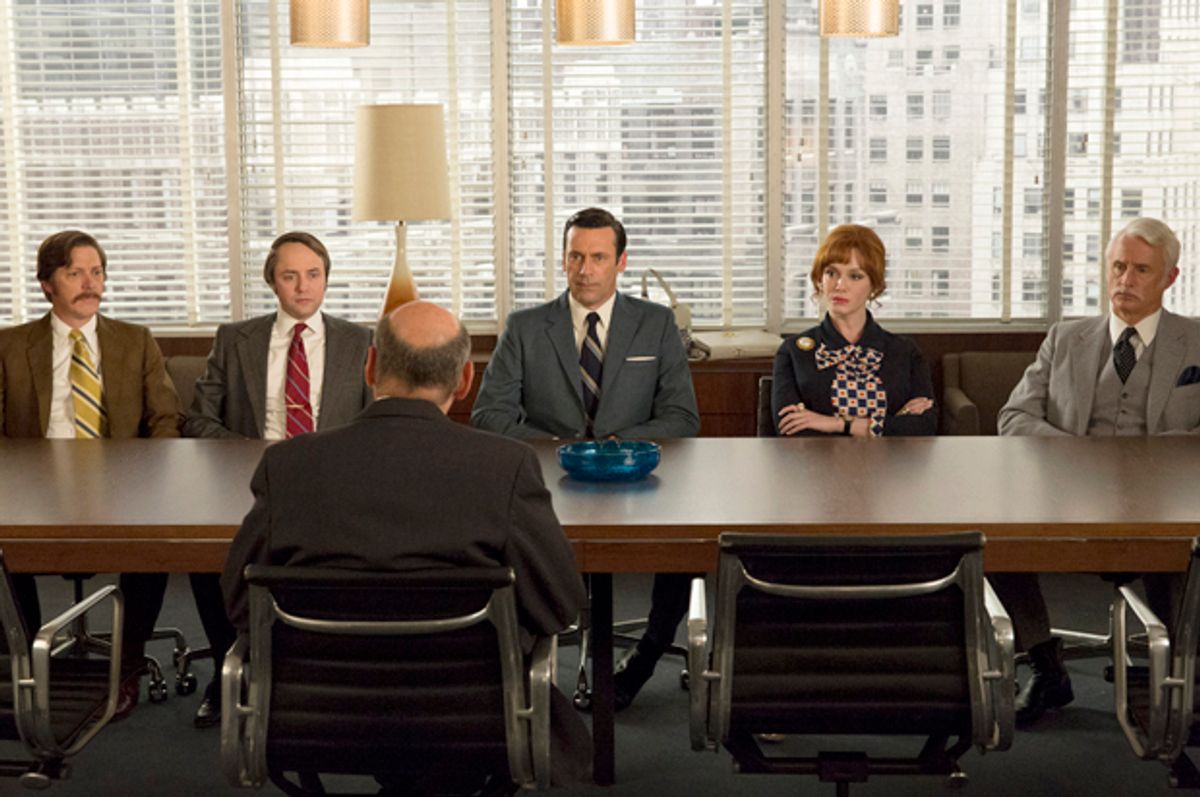Many good and just things happened at last night’s Emmys, including the breaking of a persistent racial barrier with Viola Davis’ win for best actress in a drama.
But for fans of one of television’s best shows, which just completed its run, the snubbing of “Mad Men” – honored only with Jon Hamm’s much deserved and overdue drama best actor award – is puzzling. Here’s how Time described it:
It was all but preordained: Mad Men would secure its place in television history with a final Emmy win, and therefore hold the record for most “Best Drama” victories with five sum Emmys. Most betting sites gave the AMC show the best odds for the evening.
But taking down would-be kings is Game of Thrones’ specialty, and the HBO show worked its magic on Sunday night when it stole the biggest award of the night—Best Drama—from Mad Men. It also set a new Emmys record: 12 wins for one show in a single year, including triumphs for Best Writing, Best Directing and Peter Dinklage for Best Supporting Actor in a Drama.
Dinklage is a very fine actor, and “Game of Thrones” has an epic sweep and storytelling complexity that’s impossible to deny. But let’s come back to “Mad Men” for a minute, and try to remember what it was about the show that made some of us care about it and now feel a bit ripped off. Eight years of Sterling Cooper and its various successors, and the back-and-forth over the show’s finale – and I was mostly disappointed by it – has surely made some people take the show for granted.
When it arrived in 2007, “Mad Men” may’ve been most striking for its look: the art direction, costume design, mid-century-modern furniture, and the quality of the production itself, including the cinematic, Hitchcock-influenced direction. These days, beautiful cable shows are less rare, and it’s easy to forget how sumptuous it was to look at.
But the best thing about “Mad Men” was its look at an overlooked and misunderstood period in American history. (Admittedly, there was a tension, at the very least, between the show’s love of the era’s aesthetics and its wary critique of its politics.) We’ve been inundated with fantasies about how staid the 1950s were and how the psychedelic ‘60s liberated us from all of that, but the show was far more nuanced in the way that transition took place. It looked at family mores, the limits of the suburbs, conditions for women and black people, anti-semitism, and the effects of consumerism – without feeling like a lecture. The arcs taken by Peggy and Joan made up some of the show’s best storytelling; it’s too bad neither Elisabeth Moss nor Christina Hendricks, who both racked up six Emmy nominations over the life of "Mad Men," ever won a statue for their work on the show.
Hamm was not the only exemplary actor on the show: The performances were typically low-key and restrained. John Slattery’s playboy (Roger Sterling), Bryan Batt’s closeted art director (Sal Romano), Jessica Pare’s conflicted wife (Megan Draper) and Kiernan Shipka’s wise-child (Sally Draper) brought distinctiveness to their roles.
You could conclude the last season, as I did, thinking that “Mad Men” did not entirely fulfill the critique of consumer capitalism it began in its first episodes. But in a country in which consumerism runs through our bloodstream, how many basic-cable television shows even attempted something like this?
Why did “Game of Thrones” triumph over “Man Men” in the writing and Best Drama categories? It’s impossible to know for sure, but the huge gap in viewership surely helped: Thrones drew 8 million weekly viewers and “Mad Men” peaked at 3.3 million in its final episode. (These shows have always existed at different scales: “Mad Men,” for what it’s worth, didn’t break the 2-million mark in average viewers until its fourth season.) The Emmys, of course, is not a popularity contest, but new rules which allow more members to vote brings it bit closer to that.
Because of the great claims made for it, and because it appealed to journalists and pundits and mid-century fetishists and others who tend to express opinions publicly, “Mad Men” provoked commentary far beyond its popular following. The constant critiquing also may've led to a backlash by the end.
Whatever its faults or omissions, “Mad Men” managed to show how our world was built, to surprise us with every season, and managed the feat of making us care about a bunch of advertising executives. And it did it without gratuitous nudity and graphic sex scenes or constant violence. Let’s give “Game of Thones” its due, but not forget – now that the cigarette smoke has cleared -- that Matthew Weiner’s show demonstrated, some weeks, how smart, handsome, and engaging television could be.
Here's the top three moments from the Emmy Awards:

Shares